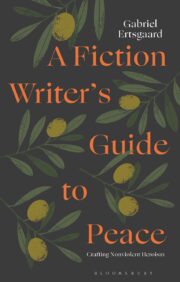Nebula Awards Interview: Rachel Swirsky by Larry Nolen
Rachel Swirsky was nominated for her novelette “A Memory of Wind”.
Instead of asking that tired question of why you became a writer, I’m curious if there were ever any moments in your writing career where you were tempted to set it aside for a while and do something else? If so, what kept you writing and submitting stories?
The only time I ever remember deliberately giving up writing for a period of time was when I was in my first (and last) year at Sarah Lawrence College. A “friend” and I went to a small writing group that someone was trying to start at the campus coffee shop (cow-print walls, rumors of occasional student sex on the tables, said sex never actually spotted) and I brought five pages of something fragmentary, because when I was eighteen, I only ever wrote things that were fragmentary. Everyone passed it around and my friend listed my many faults and compared me to a very unpopular hack writer–the story was basically literary, so the criticism wasn’t genre snobbery, just an attempt to insinuate hackishness. (These days, I have rather a lot of respect for hacks. At the time, I was in art college.)
I was very devoted to this friend and what I felt were his brilliant opinions, so I figured that was it, I was a talentless hack, and I should just stop. So I did, for about a year. It was all very angsty. I was eighteen.
What made you start back?
I suppose I should say that I never actually stopped writing altogether. I just stopped writing original fiction–the kind you turn in to college writing groups.
From the time I was sixteen until I was about twenty, I wrote volumes and volumes of Star Trek fan fiction. We (the people I was writing with and I) had wandered pretty far away from canon–we were using our own characters to write collaborative space opera adventures, featuring minimal Star Trek window dressing. After a while, the work got more bizarre and more abstracted from traditional Trek. I was excited about this strange rhyming-poetry/prose-poetry technique, which I remember wanting to turn into performance art because I was still an art college student at heart. If you’re having trouble
imagining rhyming prose-poetry Star Trek fan fiction performance art… yeah, I can’t blame you.
I realized there was potential for adapting the pieces so they no longer infringed on Paramount’s property, so I purged the Star Trek window dressing, and then used the stories to get into some college
fiction and poetry classes.
I enjoyed writing Star Trek fan fiction immensely, and I think it was a great way to get out my million words of crap while working with a mostly supportive audience.
This year’s Nebula ballot included several stories that were originally published via online publishers such as Clarkesworld Magazine and Tor.com. How much of a sign is this that online short fiction has become a visible, viable alternative to printed SF magazines?
Well, before I answer this question, I think there are a few things to keep in mind. 1) I didn’t start seriously sending out work until the fall of 2005, so online publishers have been a strong presence as long as I’ve been a working writer. 2) I just completed my term as the editor for a podcast magazine. 3) My major sales have generally been to online magazines or print anthologies. I’ve never been in the big four. My nominated story is the one from Tor.com. Etcetera.
That said–yes. Yes, I do think the nominations are at least partially a sign that online short fiction is a visible, viable alternative to print SF. Many millennials have the same perspective on the internet that I do. It’s an integrated part of our lives–reading, writing, socializing, information gathering. I’ve been traveling this week, and the number of times someone has pulled out their iphone or 3G wireless enabled laptop or [insert gadget here] to figure out where we should head, or what someone’s phone number is, or look up a piece of information, has been astronomical. As Kate Shafer commented on one of those occasions, “It’s nice living in the future.” Of course this technological shift is going to affect the dissemination of fiction. It’s very strange that substantial segments of a genre that’s ostensibly concerned with future technology can be so resistant to that.
As for why it happened this year–it’s undeniable that the new Nebula rules enabled online publications to get a toe hold they hadn’t had before. But the hope is that the wider voter pool has facilitated the inclusion of people who had previously self-selected out, while preserving the original voter pool to the greatest extent possible. And we do see a broadening of venues–online markets appear on the ballot, but at the same time, we still see representation of print markets (such as Will McIntosh’s excellent stories from Asimovs) so it’s not like the print magazines are being excluded.
You mention a generational perspective in regards to the internet and its uses. Have there been times where you have experienced what I recall Jeff VanderMeer referring to as “white noise” due to all the possible distractions that are also possible with the advent of being “wired”? If so, what have you done to combat it?
I think the white noise helps me more than it hurts. I’m very isolated where I live, so being online helps me keep in touch with actual humans. I focus better when I have a sense of being in company–and
since I don’t have a meatspace office to do that in, gchat will have to do.
With technological advances comes changes, changes that some writers have resisted, as you’ve noted. Do you think there might be an incipient change in not just how stories are disseminated, but also in how stories are crafted and imagined in the first place?
Probably. I often hear people talk about how the internet has created a profusion of interest in stories that are flash length and shorter, presumably because of shifting attention spans and the technological limitations currently involved in reading onscreen.
How valuable has being a member of writing workshops such as Clarion West and the Iowa Writers Workshop been for you?
Invaluable. But then again, it’s not like I can go back in my career and do a test run to see what kind of writer I’d be like without them.
In college, I took a fiction workshop with Karen Tei Yamashita who liked to say that she couldn’t endow people with talent, but writers who took workshops developed faster than writers who didn’t. I think she meant that writers would eventually learn what the workshop had to teach them anyway, but the workshop helped them learn it sooner.
I’m not sure to what extent this is true. Writing is actually rather teachable. Writers who come in with distinct voices usually do better than writers who don’t, in my experience, but there can be miraculous transformations of writers whose first works seem lifeless. Talent helps, but what I found as a teacher was that the really important factor was interest.
Anyway, writers are all frenetic bundles of experiences and influences. Might I have eventually realized how to improve my prose on my own? Probably. But would the stories I write be the same if I didn’t have Michael Swanwick in my head saying that all stories are a balance between dinosaurs and sodomy? Almost certainly not.
I can point to different revelations from different workshops. Clarion West gave me a confidence I hadn’t had before, and also helped me to understand the business-oriented aspects of the work. Octavia Butler urged students to aim for being full-time writers and that was a frame shift for me. The Iowa Writers Workshop could sometimes be preoccupied with things like making masterpieces–which I found very inhibitive. When someone tells you that it’s your job to be “iconic of your generation” (which someone did say to me and my classmates during our first days at the school)–well, maybe that inspires some people, but it made me want to turtle and write pulp for two years. But the writers at the Iowa Writers Workshop were all very polished in their own ways–some of them really were iconic, I think, and many could tune prose or render realistic scenes or play with tension and form in ways that were really amazing. It could be a very inspiring place.
I think one of the most important things about workshops is that they provide social connections between writers. Actual writing can be very isolating, and while groups and workshops can sometimes be educational–I think they’re also valuable as ways to provide inspiration, seek out peer groups, and get excited by how other people are thinking and changing. There have been a number of literary and artistic schools where people inspired each other intensely back and forth. Workshops can give writers a slice of that without requiring that they manage to be rich young men in Paris in 1874.
As a teacher, I recall hearing years ago that one’s greatest learning can take place when teaching another. Do you envision yourself ever becoming a writing workshop instructor?
When I was at Iowa, I was lucky enough to teach three semesters of speculative fiction and one course on revision. I don’t know if it was my greatest learning, but it was a blast.
I was particularly lucky because teaching speculative fiction gave me an edge in getting great students. My peers had to compete for the few dedicated lit students, and often got saddled with apathetic kids who didn’t really want to be there except to get their easy A. I had some of those (they were disappointed; I gave no easy As), but I also got all the excellent speculative fiction writers who felt alienated from the classes that focused on mainstream literature.
I had a core of students who took multiple classes with me, some of whom are already starting to break out. An Owomoyela graduated from Clarion West in 2008, and recently qualified for SFWA with one sale to Fantasy Magazine and two to Chizine. Jessica Lee debuted in Fantasy Magazine with “Superhero Girl” and has also appeared in Crossed Genres. Sam Ferree recently won a prestigious playwriting scholarship, and Christian Yetter and Erin Horakova are both applying for MFA programs.
I’d love to take credit for them, but the truth is they were brilliant when I met them.
Your Nebula-nominated story, “A Memory of Wind,” adds a twist to the ancient Greek story of Iphigenia and her sacrifice at Aulus. What made you decide to tackle this well-known tale and to add your own take to the myth?
In 2006, I attended a version of the Greek tragedy Iphigenia in Aulis at the San Jose Repertory theater. The traditional version of the play is about the tragedy of Agamemnon, and how awful it must be to have to sacrifice your daughter. The new version staged by the San Jose Rep shifted the point of view so that the story was about the tragedy of Clytemnestra, and how awful it must be to have your husband sacrifice your daughter.
Both these things are admittedly awful, but they also seem incomplete.
The story is ostensibly about Iphigenia. I wondered if she would ever get her chance to speak.
(There are several public domain translations of the Euripedes play. For instance, here: http://classics.mit.edu/Euripides/iphi_aul.html.)
I remember several different interpretations of that chilling scene and it seems to be one that haunted Greek poets and playwrights ever since the Homerian version. In writing “A Memory of Wind,” what connections, if any, did you find between Iphigenia and the goddess Artemis in terms of symbolic role and purpose?
When I was writing, I was focusing more on the humans than on the divine intervention. I was thinking of Artemis as being more like a natural force–an unstoppable barrier that couldn’t be negotiated with, influenced, or avoided.
Is there any chance that you might further explore this ancient setting, if not the characters directly, in any future stories?
Sure. I spent time researching it, so it may show up again.
Your March 2009 story, “Eros, Philia, Agape,” touches upon the three aspects of love. How difficult was it for you to conceive and write the basic story and then to highlight those three aspects in relation to possession? Were there many drafts, or did the story seem to write itself quickly?
I often title stories just before sending them to an editor. “Eros, Philia, Agape” was actually called “Parallel Tracks” for most of its draft process, based on a train metaphor that was eventually revised
out, which was supposed to mirror the parallel points of view. I titled the story “Eros, Philia, Agape” because it seemed to fit the story, rather than working the story to fit the title.
It took me about three years to go from the first draft of the story to the draft that I sent to Tor. I only did about six drafts, though, which is very few for me. When I wrote the first draft, I was taking a workshop with Marilynne Robinson, who had some very acid words to say about Carver-esque, minimalist styles, and also about my own bias toward cutting things down, down, down to word counts as short as possible. So I tried to take more story-time with each event, and allow myself to add indulgent linguistic flourishes. I cut some of that out later, but I think it made the revision process easier. I guess it’s related to what I’ve heard theater people say about overacting–it’s easier to pull back than amp up.
You mention that you only did six drafts for “Eros, Philia, Agape.” What story took the longest, in terms of both time and/or drafts, for you to shape into publishable form?
While “A Memory of Wind” doesn’t win most drafts or longest time in formulation, it was probably the most difficult piece I’ve ever written. I think there were a number of reasons for that, from the fact that I was trying to finish it for my graduate thesis (I didn’t), to the difficulty of sharply imagining an ancient society about which we have relatively little information. Also, one of my close friends from college developed disociative amnesia while I was working on the piece. I’d already drafted it by then, but it was strange to have someone close to me suddenly experience something similar to what I’d inflicted on Iphigenia. It hard to work on the story after that sharp, intense loss. I needed distance. I’m not sure how much my reaction to my friend’s experiences inflected what I wrote.
Besides writing short fiction, you are a prolific blogger, blogging regularly at several sites. Do you keep your blogging separate from your writing, or have there been times when a hot blogging topic might have seeped through and into a story you were writing?
I think it’s more likely to be the other way around. For instance, I recently posted about Victorian euphemisms because I was writing a story that contained some.
While I don’t write stories about political blog posts I’m writing, I sometimes write stories about political blog posts I’m reading–particularly political ones.
(By the way, I mean politics in the sense that most social justice advocates I know use it–not just elections and vote counts, but also social dynamics that are inflected by institutional power.)
Are there any future plans for having a collection or novel coming out in the next few years?
Through the Drowsy Dark, a slim volume of short stories and poems, is forthcoming from Aqueduct in May.
 Rachel Swirsky is on destination two of her bad weather tour of the United States — Bakersfield, California, where the summer days regularly heat up to one hundred and fifteen degrees of desert sun. Before moving west, she lived in Iowa City, where ice storms and blizzards provided a chilly background to her MFA studies at the Iowa Writers Workshop. Who knows where her next destination will be? Lava fields? The center of a black hole? An Alaskan shanty? She will sit, wrapped in synthetics and faux fur, shivering while she bangs out stories that appear in Tor.com, Subterranean Magazine, Weird Tales, and other venues, including year’s best collections from Strahan, Horton, and the VanderMeers. A slim volume of her fiction and poetry, THROUGH THE DROWSY DARK, is forthcoming from Aqueduct Press in May.
Rachel Swirsky is on destination two of her bad weather tour of the United States — Bakersfield, California, where the summer days regularly heat up to one hundred and fifteen degrees of desert sun. Before moving west, she lived in Iowa City, where ice storms and blizzards provided a chilly background to her MFA studies at the Iowa Writers Workshop. Who knows where her next destination will be? Lava fields? The center of a black hole? An Alaskan shanty? She will sit, wrapped in synthetics and faux fur, shivering while she bangs out stories that appear in Tor.com, Subterranean Magazine, Weird Tales, and other venues, including year’s best collections from Strahan, Horton, and the VanderMeers. A slim volume of her fiction and poetry, THROUGH THE DROWSY DARK, is forthcoming from Aqueduct Press in May.
Larry Nolen is a history and English teacher who has taught for most of the past ten years in Tennessee and Florida, in both public and private school settings. Fascinated with languages from an early age, he devotes much of his spare time to reading and translating interviews and articles from Spanish into English. Larry also has an unhealthy fascination with squirrels and dreams to one day edit an anthology of squirrel SF. His blog can be found at ofblog.blogspot.com.


